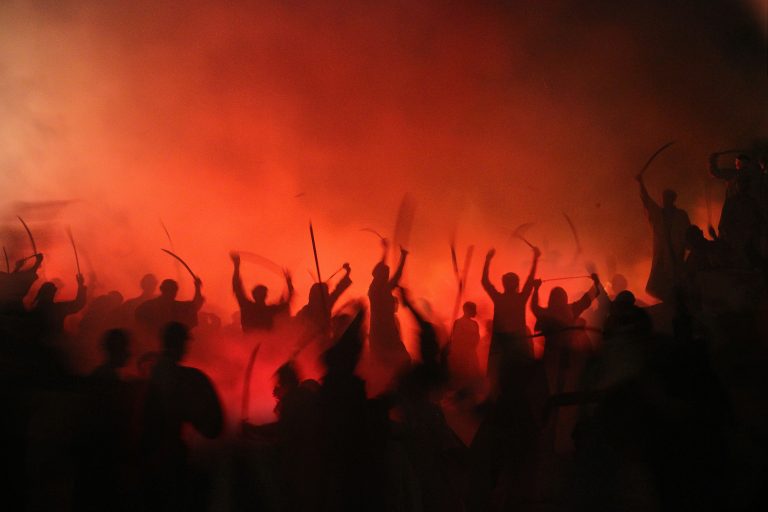
With the dawn of human consciousness came a unique and unnatural experience called inner conflict. For the first time creatures roamed the Earth free from the hard-wired programming of instinct that guided the rest of the animal kingdom. These new beings now possessed the capacity for abstract thought. A miracle had taken place – the birth of a new mind that would usher in a new age that propelled humans to the top of the food chain. Outwardly, these beings were stunningly different. They walked upright, exhibited great love, cooperation and altruism. They created things that never before existed.
The advent of self-consciousness came at a high price. Humans struggled to carry the new psychological dimension. They became angry, alienated, walking warzones, ticking timebombs capable of unspeakable carnage at any time. A bitter strife burned inside which gave way to horrendous wars and the spilling of blood onto all corners of this beautiful Earth. In fits of cruelty and indifference we would destroy in days what took centuries to create.
We euphemistically refer to this ceaseless psychological contradiction as the “human condition.” To justify collective aggression our leaders point to the defense of belief systems and natural resources, or to answer trespass, secure justice or national pride. Efforts to curb the urge to kill have failed. Religion, mind control, medication, legislation, prosecution, political ideology and international treaties have not ended our inner rage and instability. War machines drone on even as you read this. The only way to lasting peace is for each of us to end our inward battles. Fortunately, there is an antidote to inner struggle: Motiveless awareness.
Inner Conflict in Daily Life

Before delving into motiveless awareness, let’s use a recent inner conflict from my life to map psychological struggle. Only weeks ago my wife and I were receiving health promoting treatments at an alternative medical center. She was seated in a recliner to my left, hooked up to an intravenous bag filled with nutrients. My session had ended and I sat in contemplation taking in the clinic’s atmosphere when a tall, thin woman took the seat to my right.
As she spoke to the staff preparing her treatment, seemingly out of nowhere came the feeling I should hold her hand. It was reassuring, as if this was the most natural thing in the world. I effortlessly saw and felt what it would be like for our hands to be joined: it would be innocent, peaceful and almost familiar. There were no words, just a silent prompting from within. That’s when conflict broke out.
“No way we’re doing that,” the familiar voice in my head said dismissively. It was decided. Case closed. The voice of experienced based authority assumed the roles of judge, jury and executioner. The arguments it provided for this stern denial were reasonable: How would this lady react to a stranger taking hold of her hand? Would I be escorted out and asked never to return? Would the police be called? Even if this woman agreed to hand holding, how would I explain it to my wife? According to the conscious, verbal part of my mind, no good outcomes existed.
Still, the quiet, peaceful prompting persisted in complete disregard for the articulated warnings of my reasoning mind. I stood on a familiar battleground: on one side instinctual, intuitive awareness; on the other, thought-based consciousness. Instead of taking sides, I remained open, curious, questioning. There was no goal being sought, for that would have limited the search and implied a conclusion. I was not trying to resolve this conflict. For any action to stop the conflict would only perpetuate it. My awareness was innocent with no trace of self-interest, no beliefs, no hint of past experience. Unencumbered, this unfiltered awareness enabled me to gather information by making direct contact with reality. It provided the tranquil inner space needed to let the conflict play out and for understanding to take place.
With motiveless awareness operating, I calmly looked over and saw the woman was wearing white cotton gloves as she tapped and swiped her mobile phone. My verbal mind immediately surmised she was a germaphobe, another arrow in its quiver. I remained open and respectful to both intuition and reason. There was only an earnest questioning, a state of observation without words, judgments or fearful projections. This was a calm search to understand what was actually happening.
Soon the lady and I were engaging in small talk and she revealed what had brought her there. About two months earlier she had contracted Lyme Disease. She said it caused her hands to swell so badly they looked like Minnie Mouse’s. The swelling diminished after various courses of antibiotics, but left her hands extremely sensitive. The gloves prevented excruciating pain when touching anything. “Some people think I’m a germaphobe,” she laughed.
“You may find this strange,” I cut in. “But for a little while now I’ve been feeling I should hold your hand.” She held a gloved hand out and I took it.
“For healing,” she said with a smile.
“I guess so,” I replied, astonished to find myself living this controversial scenario.
A Place for Intuition

We shared some understandings we’d reached over the years. Happily married and a grandmother, she fondly spoke of how one grandchild was an “old soul” while the other wasn’t. After a while I gently released her hand. Kathy had been listening to our talk and prompted me to tell the lady about my book, Beyond the Sphere. When her treatment was done, Kathy stood up and joined the conversation. We all got along so well we took a photo together. Conflict resolved.
Dire predictions of the voice of experience had proved wrong. Instead, the event turned out to be deep, healing and enlightening. Looking back, the wordless part of my mind that speaks in feelings, urges, impressions, symbols, intuition and instinct, was aware of more than the reasoning, verbal mind. It understood the woman next to me needed a healing touch. While this intuitive mind spoke in gentle, subtle terms, it was beyond the understanding of the dominating conscious mind. Intuition was a valuable source of intelligence and information the reasoning mind could have taken in instead of condemning.
The habitual and casual dismissal of our intuitive awareness causes it to become frustrated, angry, twisted and dark. Impulses grow more powerful and the conscious mind responds with fear and authoritarian crackdown. Look around and you will notice the outward expressions of this dynamic. See how criminal justice systems attempt to restrain the darker, mysterious impulses of humanity with verbal cages we call the law. See how our social mores are built to dominate the wordless impulses we fail to grasp, such as the desire to own something belonging to another. Look at the Ten Commandments, how they attempt to corral our pre-verbal, instinctual mind. The war within and the catastrophes it creates has resulted in a self-loathing that has even appeared in the teachings of our so-called enlightened spiritual guides. Think of all the condemnation, suspicion and shade gurus throw at the self, the ego.
Back to the Garden

This ancient conflict is illustrated in Genesis using two trees: the Tree of Life and the Tree of Knowledge. The first tree, which Adam and Eve were instructed to eat from, represents the instinctual mind that allowed the first humans to live happily and effortlessly in nature. So long as they got sustenance from it, they would remain connected to God and the universe. However, they were warned if they ate from the Tree of Knowledge, it would cut them off from their Source and from nature. Their idyllic connectedness would be casualties in the pursuit of knowledge.
Over the centuries many theories have been offered about this clash between the instinctual and the conscious dimensions. They include original sin, the existence of an imperfect ego, a false sense of a separate identity and even the devil. None of these explanations brought about the integration of the human mind. We remain ignorantly locked in a war with ourselves. We suffer as the intuitive side of our inner landscape is oppressed by the reasoning, conscious mind. Dismissing the quiet, subtle voice of intuition creates frustration and ignorance, causing it to become increasingly agitated. What might start out as a nudge to connect with others, if repressed, can become a violent urge to commit assault or rape. Alienation is a common thread connecting every serial killer or mass murderer. Our constant ax strikes against the Tree of Life have turned it into a gnarly, ugly and dangerous forest.
Meanwhile, the literal, verbal mind, with its structured morality and laws, becomes an ignorant tyrant whose main obsession is dominating the mysterious and troublesome urges that seem to appear out of nowhere. There seems to be a belief that if we give instincts an inch, they will take the mile. Fear of one’s own self has infected our operating system. Ironically, the fruit of the Tree of Knowledge is inward ignorance.
Motivelessly Aware

Motiveless awareness is critical to addressing the human condition. Humans are endowed with an essential instinctual mind. It is an ancient, living awareness that enabled us to survive while allowing us to feel part of nature. We share this awareness with the rest of the animal world. It seeks connectedness, acceptance, and cooperation. The conscious, verbal mind emerged later in our evolution, creating a disturbance in the natural order. The verbal mind operates outside of instinct. It comprehends cause and effect and is capable of complex mental functions. It can question anything and pushes us beyond basic existence. The conscious mind has brought us all the wonderful technology we enjoy today: the planes, toasters, indoor plumbing, comfortable clothing, cell phones and so much more. It also can predict outcomes – which many times prove overly negative and incorrect. It exists in isolation, is limited in its calculations by the information it has accumulated – which can never be complete – and so cannot be left with the final say on every potential course of action. Without intuition and instinct, we would lead the loveless, sterile lives of machines. For this reason, the right balance must be struck.
Until we understand ourselves, the conscious mind will continue to misunderstand and dominate our preverbal, instinctual awareness. The two do not speak the same language. One communicates with feelings, symbols, urges and intuition. The other is literal, exacting, legalistic and often defensive. Both are needed. Ultimately, our original intuitive awareness and our conscious mind will merge in mutual respect and understanding to form a totally new and necessary creature: the fully conscious being. The self-actualized human is the final piece of the Creation puzzle. This marvelous universe needs a loving, attentive caretaker who can step outside mere instinct and appreciate the wonders of what God has wrought.

Al Guart is a Pulitzer Prize nominated investigative journalist whose work has appeared in the New York Post and Agence France Presse. He also produced in-depth television news segments for CBS News. He is author of the groundbreaking book, Beyond the Sphere: Encounters with the Divine, which explores the powerful impact Divine Visitations have had on humanity.


